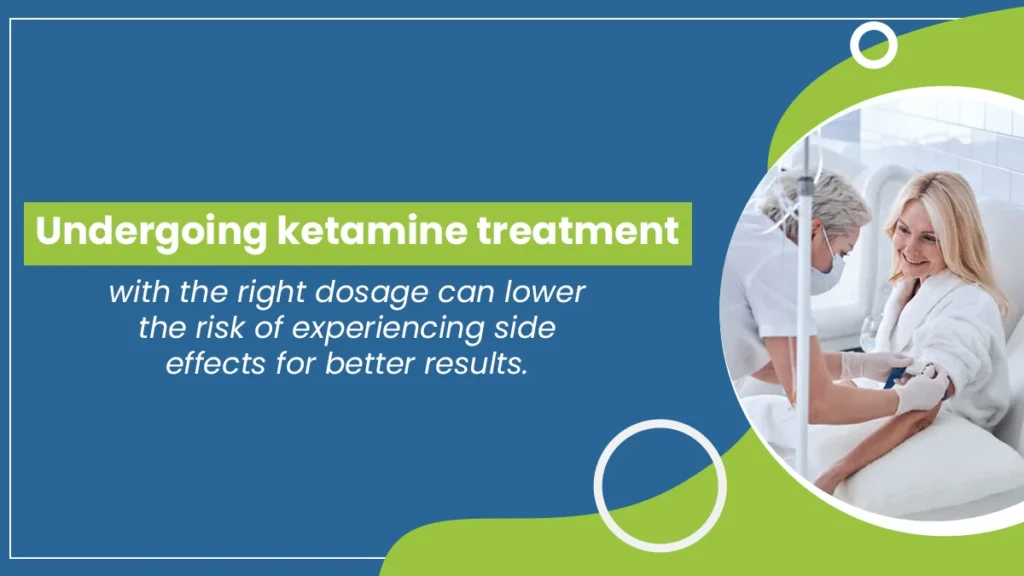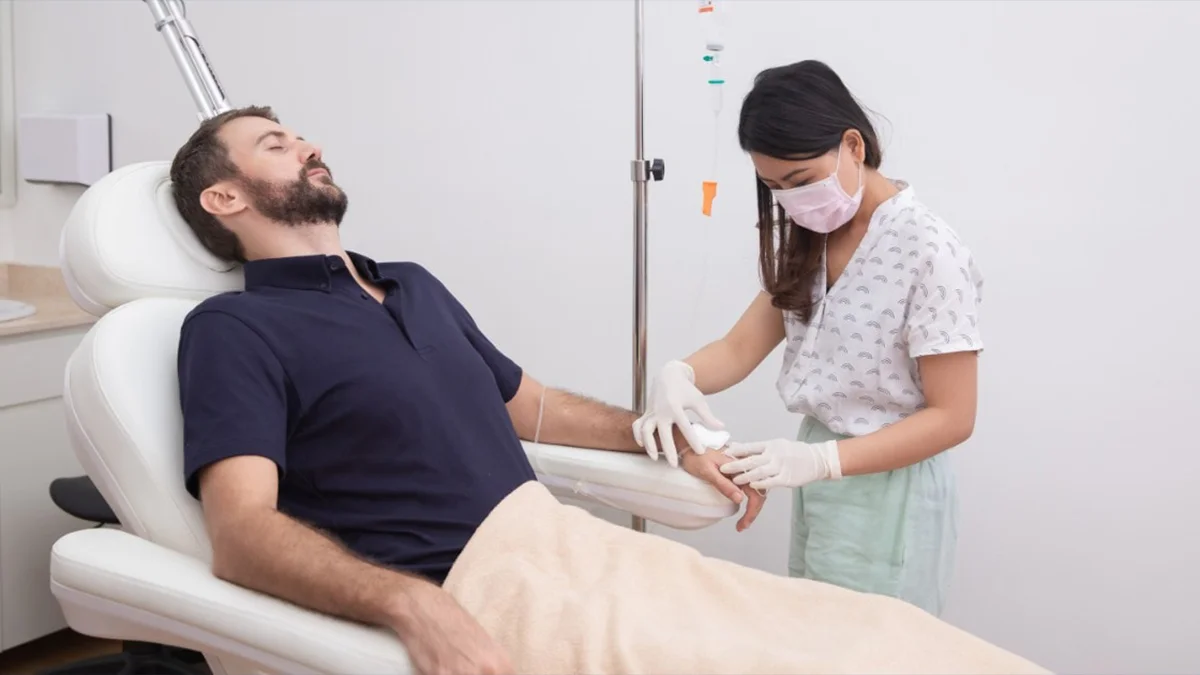Ketamine therapy, used primarily for depression and chronic pain, is gaining popularity in the field of mental health. There are many benefits of ketamine for people with treatment-resistant depression and anxiety. However, it is essential to shed light on its side effects.
Patients must discuss potential adverse effects with their doctor and closely follow their guidance during ketamine treatment for mental health disorders.
Key Takeaways
Ketamine therapy aids depression, but side effects are important to consider as it can impact overall well-being. Here’s what you need to know:
- Ketamine therapy works by acting on the brain to improve mood regulation.
- Short-term and long-term effects can cause hallucinations and depressive symptoms.
- Undergoing treatment with the right dosage can lower the risk of experiencing side effects for better results.
The Haven Detox-New England can help you beat mental illness. Call us today at (844) 933-4145.

How Does Ketamine Therapy Work?
During a ketamine therapy session, patients typically receive the medication through an intravenous (IV) infusion or a nasal spray of esketamine. Ketamine crosses blood-brain barriers and interacts with neurotransmitters in the brain, particularly glutamate, linked to mood regulation.
This interaction helps create new neural connections, potentially alleviating symptoms of depression. The process is relatively quick, with effects often felt within hours. Why ketamine works to treat treatment-resistant depression is not yet fully understood. Still, ongoing research aims to understand how ketamine works and its impact on the brain.
Positive Results in Conditions Treated with Ketamine
Ketamine therapy treats various mental health conditions, especially when other methods prove ineffective. In a hospital setting, subanesthetic doses of ketamine are administered through low-dose ketamine infusions. This approach has been particularly beneficial for severe depression, bipolar disorder, and mood disorders.
Ketamine use has demonstrated positive outcomes in reducing suicidal thoughts and self-harm tendencies. Notably, for those not responding well to selective serotonin reuptake inhibitors, a small dose of ketamine can be a potential alternative. That offers hope for individuals dealing with challenging and persistent mental health issues. It’s important to note that while undergoing ketamine therapy, some individuals may experience dissociation and various other side effects.
Side-Effects of Ketamine Therapy
Understanding and addressing possible side effects, both short-term and long-term, are vital elements of responsible usage. Always consult with healthcare professionals to ensure safe and monitored administration.
Short-Term Effects
Ketamine, a medication primarily used for anesthesia and pain management, can have short-term effects on individuals. When administered, it may lead to acute effects like sedation and hallucinations. These hallucinations can be vivid and intense, altering perception temporarily.
However, it’s essential to be cautious, as there’s a potential for allergic reactions. Some individuals may experience unexpected responses, such as elevated blood pressure, requiring medical supervision.
Long-Term Effects
Extended use of ketamine raises concerns about potential long-term effects. Prolonged and frequent use may lead to drug addiction or even substance use disorder. Individuals using ketamine over an extended period might encounter depressive symptoms, affecting their mental well-being.
Moreover, there is a need for awareness regarding the risk of suicidal ideation in some cases. It is crucial for individuals undergoing ketamine therapy to inform their doctor if they experience such effects.
Effects on Physical and Mental Health
Ketamine infusion therapy and nasal spray for mental health treatment can have both physical and psychological effects. Here’s what you need to learn about its impact:
Physical Effects
During and after ketamine infusion therapy, individuals may experience changes in their body. Some may feel a sense of light-headedness or dizziness. There’s a possibility for changes in body sensations, ranging from numbness to heightened sensitivity.
Long-term use of ketamine, especially as a club drug, may impact the bladder, leading to complications. Patients must report any discomfort, as severe side effects can include heart issues and respiratory problems.
Psychological Effects
Ketamine’s powerful effects on the mind can result in psychological changes. Some individuals may feel confusion or agitation during treatment.
While ketamine therapy can alleviate thoughts of suicide for some, it’s essential to communicate any unwanted effects promptly. Some individuals might experience vivid nightmares and may lose touch with reality for some time.
Weighing the Pros and Cons
Ketamine therapy has shown promise in treating severe depression and certain mental health conditions. While some individuals report significant benefits, risks must be carefully considered.
Potential side effects include hallucinations, dissociation, and elevated blood pressure. Long-term effects and potential for abuse also raise concerns. Consultation with a qualified healthcare professional is crucial to assess individual suitability.
Medical experts are still studying if the ketamine treatment option works well and is safe for a long time. Deciding to try it should include thinking about the good things it might do and the possible problems it could cause. It’s important to have a doctor watch over everything closely to make sure it’s safe and fits your needs for mental health treatment.
Dosage Guideline for Safe Use
When using ketamine for therapy, it’s crucial to follow dosage guidelines set by your healthcare provider. In a clinical setting, professionals carefully regulate the amount of medicine to ensure safety and effectiveness. Here are some key points to consider:
- Stick to low doses: Therapeutic ketamine doses are often lower than those used as general anesthetics, minimizing risks.
- Understand the benefits: Your healthcare provider will discuss how ketamine can help with conditions like depression, ensuring you’re aware of potential positive effects.
- Monitor side effects: Regular check-ins with your healthcare provider help manage and address any side effects of ketamine therapy.
It is best to always rely on the expertise of your healthcare provider to navigate the treatment safely. Adherence to the prescribed dosage in a controlled clinical setting ensures the benefits of ketamine therapy while prioritizing your safety and well-being.
Frequently Asked Questions (FAQ)
What are the most common side effects of ketamine therapy?
Common side effects may include a temporary increase in blood pressure, dizziness, and physical discomfort. Some of the short-term common effects include sedation, nightmares, and vivid hallucinations. Always communicate any concerns or experiences of side effects to your healthcare team at ketamine clinics.
Can ketamine therapy cause any psychological side effects?
Yes, ketamine therapy may lead to psychological side effects, such as confusion, dissociation, and mood swings. These effects are usually temporary and managed in a clinical setting. In severe cases, like misuse of ketamine, it may cause suicidal thoughts.
Doctors monitor patients for safe dosages to avoid any adverse reactions. If you experience any concerns or changes in how you feel during ketamine therapy, it’s crucial to share them with your healthcare provider.
What are the long-term effects of using ketamine?
Long-term use of ketamine products, especially as a recreational drug, may impact the bladder, leading to complications. Chronic usage can also result in psychological dependence and tolerance, where higher doses are needed for the same effects. While therapeutic ketamine is administered in controlled settings, prolonged use can lead to respiratory depression and adverse health effects.
Find Hope for Recovery at The Haven Detox-New England
Ketamine therapy side-effects can complicate the recovery process from mental illness. There is no need to suffer when recovery is possible with the holistic approach at The Haven Detox-New England.
Our team of medical experts crafts a mental health treatment plan that involves counseling and therapy sessions. For 24/7 medical care, we offer residential treatment in a supportive setting. This program provides various facilities, such as nutritious meals and prescription drugs, to ensure a smooth recovery from mental disorders such as depression, anxiety, or PTSD.
Call us today at (844) 933-4145 for more information.
Verify Insurance
Let’s get you or a loved one help with a few simple steps.




